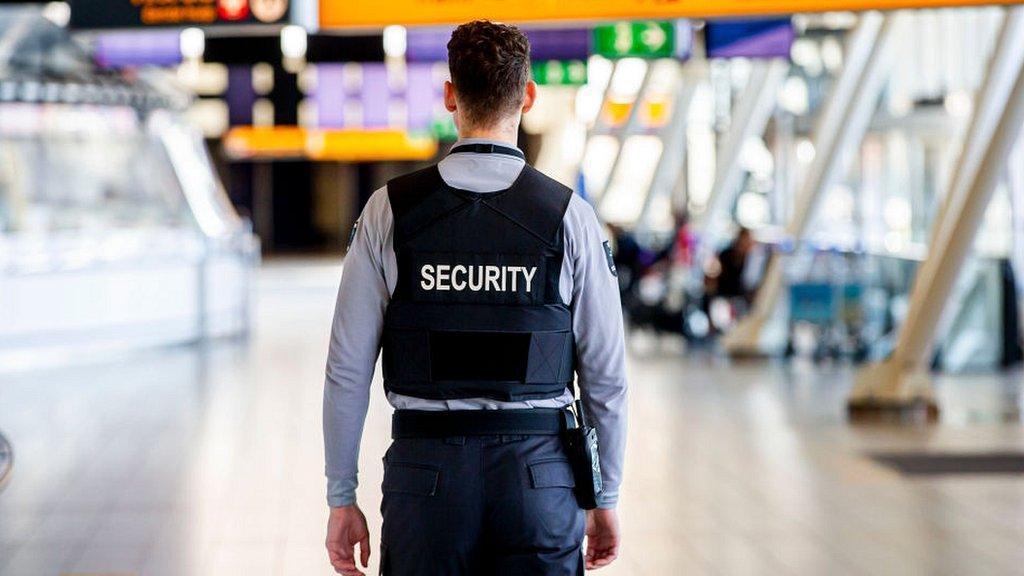Coronavirus: US airports in disarray over screening
- Published
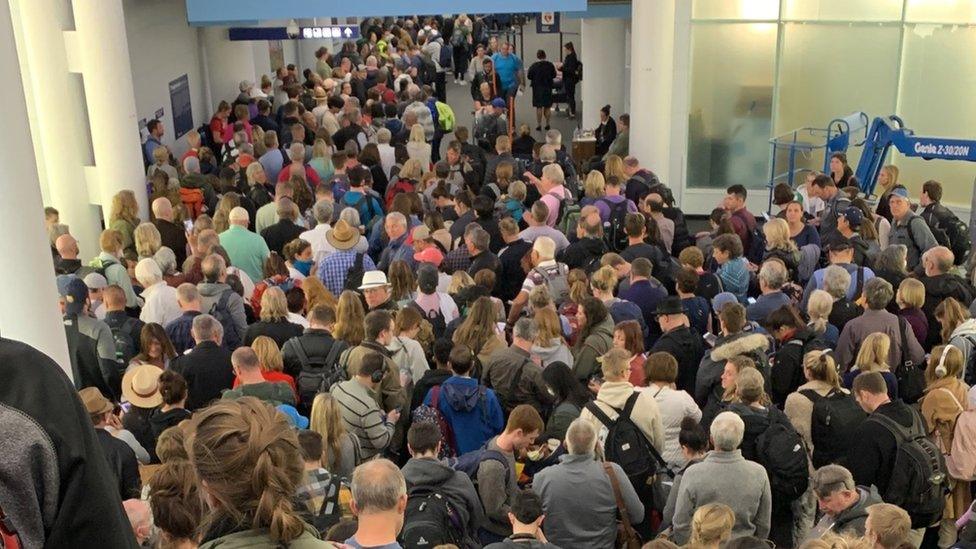
Passengers arriving at Chicago O'Hare airport faced lengthy waits
US airports have been thrown into chaos as new coronavirus health screening measures for people returning from Europe come into force.
Long queues formed as travellers waited for hours for the screenings before passing through customs.
The US is banning the entry of people travelling from the UK and Ireland from midnight on Monday (04:00 GMT Tuesday).
As a result, the UK Foreign Office is now advising against all but essential travel to the whole of the US.
President Donald Trump tweeted on Sunday that the US is "doing very precise Medical Screenings at our airports".
"Pardon the interruptions and delays, we are moving as quickly as possible, but it is very important that we be vigilant and careful. We must get it right. Safety first!"
The US has more than 2,700 confirmed cases, with 54 deaths.
Correspondents say there is a growing sense of unease and confusion in the US, with fears of a run on hospital beds and concern about childcare as tens of millions of children are sent home from school.

LIVE UPDATES: Follow the latest developments here
EASY STEPS: How to keep safe
A SIMPLE GUIDE: What are the symptoms?
TRAVEL PLANS: What are your rights?

During a briefing on Saturday, the White House suggested domestic travel restrictions may be coming.
Mr Trump said: "If you don't have to travel, I wouldn't do it. We want this thing to end. We don't want a lot of people getting infected."
But infectious diseases chief Dr Anthony Fauci told ABC News, external on Sunday that the notion was "not seriously discussed".
"I don't see that right now or in the immediate future. But remember, we are very open-minded about whatever it takes to preserve the health of the American public."
In other developments:
American Airlines says it plans to cut 75% of its international flights until 6 May
Oklahoma Governor Kevin Stitt has come under fire, external for a tweet, since deleted, showing selfies with his family at a crowded restaurant
French voters are going to the polls for local elections which are controversially going ahead despite the coronavirus outbreak
UK Health Secretary Matt Hancock says moves are being planned in the coming weeks to isolate anyone over the age of 70
What has been happening at the airports?
At Chicago O'Hare and Dallas-Fort Worth airports, passengers reported long queues as travellers returning from Europe waited to be screened as part of measures to combat coronavirus.
The US administration has imposed a ban on non-Americans travelling from the 26 European countries in the Schengen free movement zone. The ban will be extended to the UK and Ireland as of Tuesday.
US citizens are allowed to return but face screening.
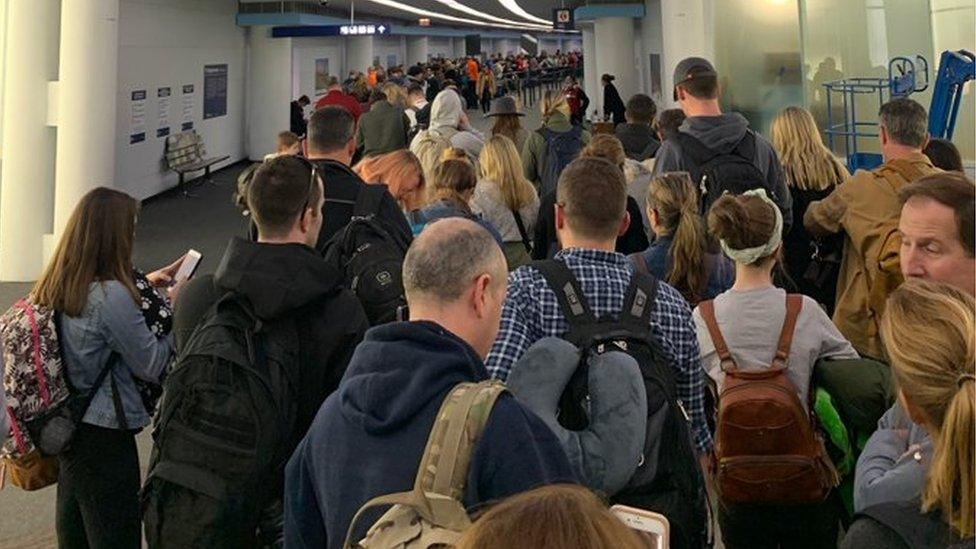
Passengers arriving at O'Hare on Saturday had to wait for several hours to clear screening
Ruth Procopi, who has lived in the Chicago area for 20 years, returned on Saturday from the UK, where she had been visiting family.
"I arrived at [O'Hare airport] from Heathrow at about 3:30pm yesterday. It was chaos. Nobody explained anything," she told the BBC.
"And I was one of the lucky ones - I had no checked bags to try to find and because I had not been to a Schengen country, I did not have to undergo additional screening (still not sure what that was), but I didn't find out until I got to the front of this line.
"We were told there was additional screening while on the plane, but no details. We were not told anything at any stage. It took me two hours to get through."
Illinois Governor JB Pritzker said the long lines at O'Hare were "unacceptable".
Allow X content?
This article contains content provided by X. We ask for your permission before anything is loaded, as they may be using cookies and other technologies. You may want to read X’s cookie policy, external and privacy policy, external before accepting. To view this content choose ‘accept and continue’.

People have been tweeting pictures and videos of passengers waiting to be processed, forming large crowds in airport terminals:
Allow X content?
This article contains content provided by X. We ask for your permission before anything is loaded, as they may be using cookies and other technologies. You may want to read X’s cookie policy, external and privacy policy, external before accepting. To view this content choose ‘accept and continue’.

Passengers are being questioned about their medical histories and checked for symptoms.
Another O'Hare traveller, Tim Clancy, told the BBC the airport was "really hectic".
"I felt there wasn't a lot of access to hand sanitiser or restrooms because you'd likely lose your place in the queue. I didn't see too many people coughing though."
Mr Clancy, 20, was returning home after studying in Athens, Greece. He ended up queuing for a total of five hours. A nurse took his temperature before he was allowed to leave the airport.
"After being on a plane where everyone was tightly packed in it felt like they were encouraging the disease to spread rather than doing anything to curb it," he said.
Paige Hardy, a US graduate student returning from London, told the New York Times there was alarm on her flight to Dallas, external after a series of confusing announcements.
"It truly felt like an apocalyptic scenario," she said.
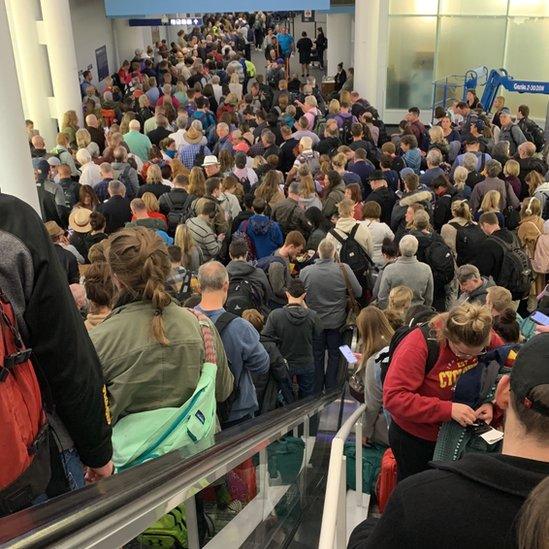
Passengers were packed into dense lines to undergo screening

In New York, there were reports of a flight from Paris being boarded by customs agents wearing masks.
Acting Homeland Security Secretary Chad Wolf said his office was working with airlines to improve screening times.
Some public health experts have noted that waiting in crowded terminals could potentially lead to more people becoming infected with the virus.


On Friday, President Trump declared a national state of emergency to release $50bn (£40bn) to fight the spread of the virus.
A doctor who became a patient describes what it's like to get tested for coronavirus

How have your travel plans and holidays been affected by the coronavirus? Share your experiences by emailing haveyoursay@bbc.co.uk, external.
Please include a contact number if you are willing to speak to a BBC journalist. You can also contact us in the following ways:
WhatsApp: +44 7756 165803
Tweet: @BBC_HaveYourSay, external
Send pictures/video to yourpics@bbc.co.uk, external
Please read our terms & conditions and privacy policy
- Published15 March 2020
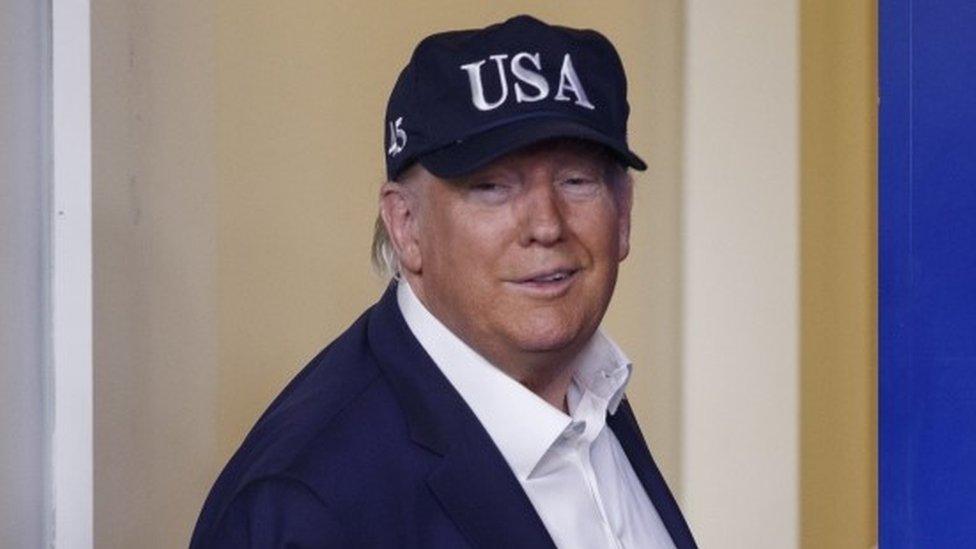
- Published13 March 2020
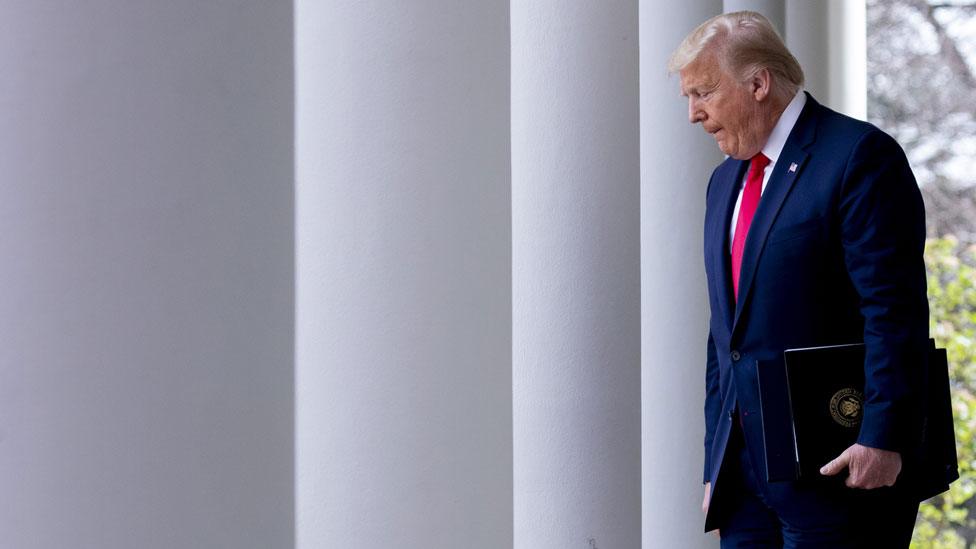
- Published25 January 2022
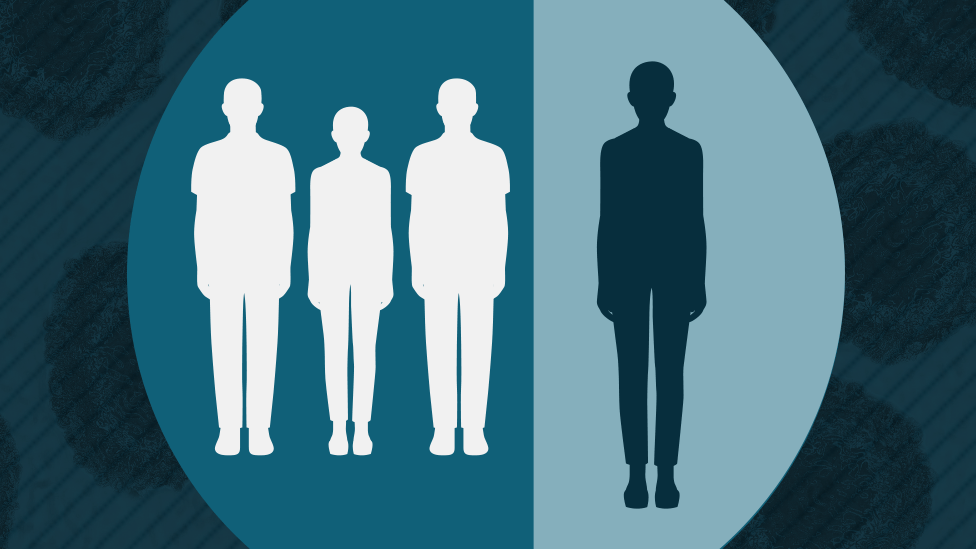
- Published5 July 2022

- Published1 April 2020
